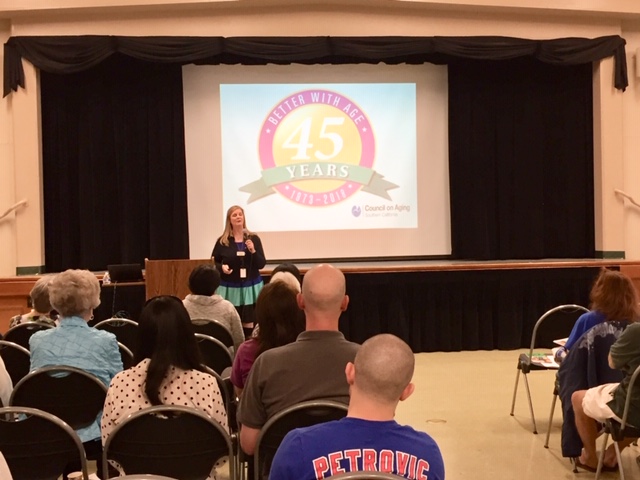By Rosemary Lewallen
St. Irenaeus Health Ministry sponsored a fascinating workshop on elder abuse prevention on May 20th featuring speaker, Kelli Jean Morris, JD, LLM, Director, Senior Protection Program (SPP) and Coordinator of the Financial Abuse Specialist Team (FAST) from the Council on Aging, Southern California. Kelli began by explaining the other free services available through the Council on Aging to assist older and disabled adults and their families. These include the Health Insurance Counseling & Advocacy Program (HICAP); Long-Term Care Ombudsman Program; Reconnect Early Intervention Services; Friendly Visitor Program; SmileMakers Guild; and Answers Guide.
Kelli gave some stunning statistics. Presently there are about 400,000 elders in Orange County, but the number of elders (age 65 and over) is predicted to double by 2050 and the number of people age 85 and over, the most vulnerable, will triple. With this growth of older adults, the risk of elder abuse is predicted to rise.
Kelli cited the legal definition of elder abuse and the forms of elder abuse: physical, emotional, neglect and financial abuse. Overmedicating a resident is one form of physical abuse. Self-neglect can occur due to physical or mental decline or from the senior’s fear of not being able to afford medications. It is estimated that 11% of all elder abuse cases in the United States occur in California. Approximately 1 out of 14 cases are known to authorities, but it may be as high as 1 in 25, according to a study in New York. Financial elder abuse is the fastest growing form of elder abuse in the country.
Elder abuse is the most unreported crime. The primary reasons that elder abuse is not reported are embarrassment to have been scammed; fear of the perpetrator; reliance on the perpetrator to take care of them and reluctance to report against a family member.
The most common types of financial abuse, in order of prevalence, are: #1The Romance Scam, #2 The Grandparent/family/friend Emergency, #3 Imposter Scams, such as the IRS scam, #4 Employment Scams and #5 Sweepstakes/lottery/prizes or unexpected winnings.
Kelli emphasized the need to report all forms of elder abuse. Physical elder abuse needs to be reported to Adult Protective Services (APS) or the local police department. If you report to APS, your report will be confidential. If you are a victim of financial scams or fraud, report to local law enforcement, APS or the Federal Trade Commission (FTC). You may be able to prevent others from being victimized. Sometimes you can get your money back, but it is difficult. The best way to avoid becoming a victim is prevention through education.

If you suspect abuse of someone at a long-term care facility, call the Ombudsman and they will investigate it. Your call can be made anonymously. Ombudsman, Vicki MacDonald, RN, spoke briefly about what she does. She encouraged those who were interested to take the training and become Ombudsmen.
Also present at this workshop with informational materials were Officer Julie Marquez from the Cypress Police Department and two representatives from programs at the Council of Aging, Southern California.
St. Irenaeus Health Ministry wants to thank Kelli Morris for her excellent presentation on elder abuse, a subject that is very important for the protection of seniors and their families, and appreciates the dedication of Vicki MacDonald, Ombudsman, and the presence of Cypress Police Department and members of the Council of Aging, Southern California.

